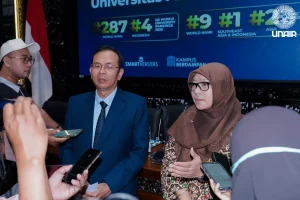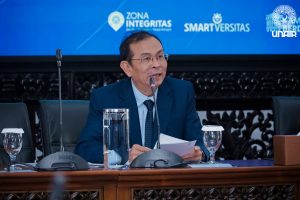UNAIR NEWS – Judges play an indispensable role in court proceedings, holding the authority to control the courtroom and deliver final verdicts. However, their role extends far beyond issuing rulings; they are the vanguards of justice.
It was underscored by Prof. (HCUA) Sunarto during his academic speech at the conferment of Honorary Professorship at the Faculty of Law, Universitas Airlangga (UNAIR), on Monday (June 10, 2024). The ceremony was held at the Garuda Mukti Hall, MERR-C Campus Management Office of UNAIR.
The event was attended by several high-ranking government officials, including the Minister of Law and Human Rights, Prof. Yasonna Hamonangan Laoly, SH, MSi, PhD; Chief Justice of the Supreme Court, Prof. Dr. H Muhammad Syarifuddin, SH, MH; Dr. (HCUA) Dra Hj Khofifah Indar Parawansa, MSi; and other dignitaries.
Judges as Custodian of Justice
Prof. (HCUA) Dr. H Sunarto SH MH, Honorary Professor at the Faculty of Law, Universitas Airlangga (UNAIR), emphasized that judges are not merely enforcers of the law. “Judges are the custodians of justice,” he stated.
The role of a judge is demanding, requiring a profound understanding of justice. “The values of justice is not solely derived from legal textbooks but also from deep-seated moral principles,” he explained.
Prof. (HCUA) Sunarto emphasized that law without justice is a hollow set of rules. Judges should look beyond the formalities of the law and consider the social, cultural, and humanitarian impacts of their decisions.
In their decision-making, he continued, judges must be experts in both knowledge and reasoning. “True justice cannot be achieved if judges focus only on legal knowledge. They must be lifelong learners, constantly enhancing their knowledge across various fields,” asserted the Deputy Chief Justice of the Supreme Court of Indonesia for Judicial Affairs.
Prof. (HCUA) Sunarto believes that the establishment of justice is fundamental for a nation’s progress. “Public satisfaction with a fair and transparent judicial system forms a strong foundation for the nation’s continuity,” he emphasized.
Nonetheless, justice is difficult to achieve if judges merely act as legal processors. Judges must embody the living spirit of justice in their decisions.
Integrity of a judge
A judge’s integrity is equally crucial. Integrity involves more than just rejecting bribes or avoiding corruption; it is demonstrated by consistently upholding justice principles, even under difficult or risky circumstances.
Prof. (HCUA) Sunarto also called on judges to embrace a holistic view of justice. He believes that truth can be upheld by adhering to humanitarian and justice values. “Judges are the true reflection of justice. The public can trust that the truth will always prevail. Justice will always be upheld,” he declared.
Author: Icha Nur Imami Puspita
Editor: Yulia Rohmawati









